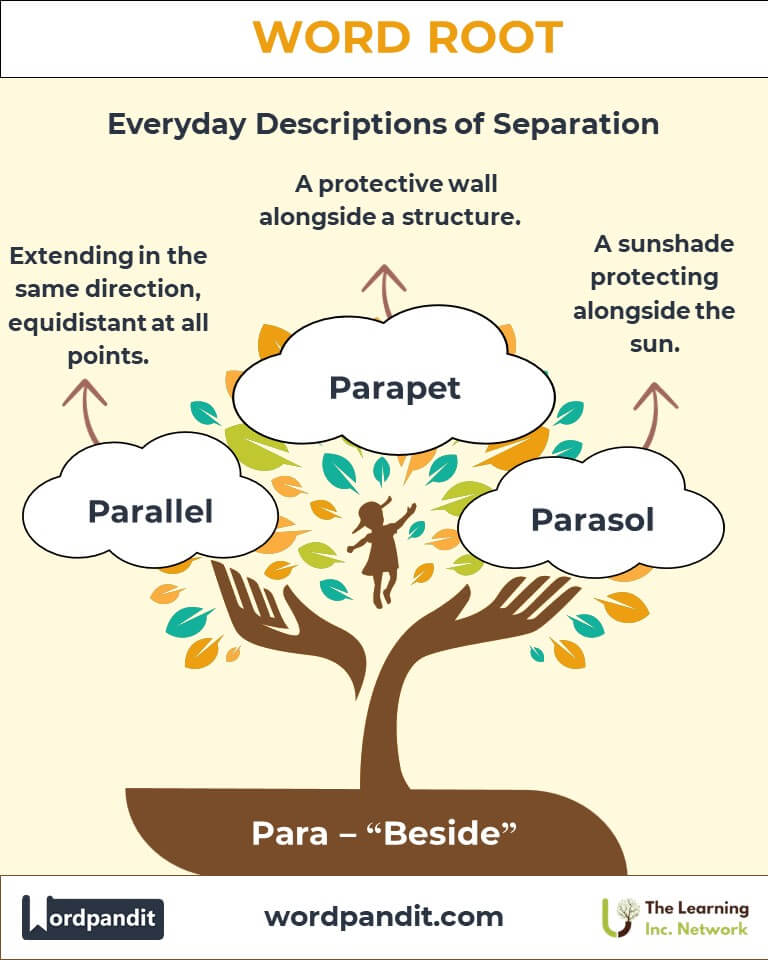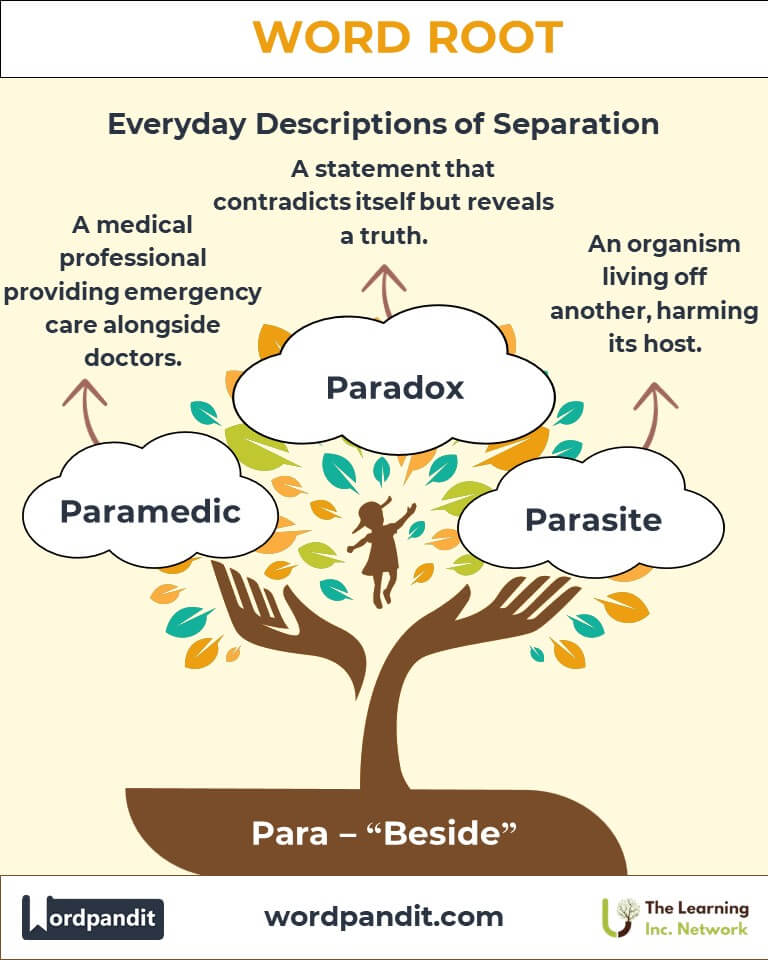Para: A Root of Proximity and Parallel Perspectives
Byline:
Discover the versatility of the root "Para," derived from the Greek and Latin meaning "beside" or "alongside." From geometry to medicine, this root creates words that evoke the idea of being parallel, protective, or proximate, with applications in various fields and everyday life.

Table of Contents
- Introduction: The Significance of "Para"
- Etymology and Historical Journey
- Mnemonic: Unlocking the Power of "Para"
- Common "Para"-Related Terms
- "Para" Through Time
- "Para" in Specialized Fields
- Illustrative Story: "Para" in Action
- Cultural Significance of "Para"
- The "Para" Family Tree
- FAQs about the "Para" Word Root
- Test Your Knowledge: "Para" Mastery Quiz
- Conclusion: The Ever-Present "Para" Root
Introduction: The Significance of "Para"
Have you ever considered what connects words like "parallel" and "paramedic"? The answer lies in the versatile root "Para," pronounced "pa-rah," which means "beside" or "alongside." This root underpins concepts that emphasize adjacency, support, and alignment, resonating in fields ranging from geometry to emergency medicine.

Etymology and Historical Journey
The root "Para" has origins in both Greek and Latin. In Greek, "para" means "beside" or "near," while its Latin counterpart carries a similar meaning of proximity. This root has journeyed through centuries, evolving from its literal sense of adjacency to encompass metaphorical and specialized uses, such as "paradox" (something counter to expectation) and "parachute" (protection alongside descent).
Mnemonic: Unlocking the Power of "Para"
To remember "Para," imagine two parallel lines running side by side or a paramedic working alongside doctors in an emergency.
Mnemonic Device: “Para keeps things parallel or provides support beside the main action.”
Common "Para"-Related Terms
- Parallel: Extending in the same direction, equidistant at all points.
Example: "The railway tracks run parallel to each other." - Paramedic: A trained medical professional who provides emergency care.
Example: "The paramedic stabilized the patient en route to the hospital." - Paradox: A statement that seems contradictory but may reveal a truth.
Example: "Less is more" is a famous paradox in design. - Parachute: A device used to slow descent from high altitudes.
Example: "The skydiver deployed the parachute just in time." - Parasite: An organism that lives off another, harming its host.
Example: "The parasite weakened the tree by feeding on its roots."
"Para" Through Time
- Parapet (Middle Ages): Derived from Italian, meaning a protective wall alongside a structure.
Historical Context: Parapets were essential in fortifications. - Parasol (17th Century): A sunshade, originating from French and Latin roots for "protecting alongside the sun."
Cultural Shift: While initially functional, parasols became fashion accessories in Victorian times.
"Para" in Specialized Fields
- Geometry: Parallel—Lines that never meet, fundamental in geometry and engineering.
- Medicine: Paramedic—Critical in emergency response, working alongside doctors.
- Biology: Parasitology—The study of parasites and their hosts.
- Literature: Paradox—A tool for illustrating complex truths or contradictions.
Illustrative Story: "Para" in Action
Emma, a paramedic, was called to a challenging case—a hiker injured on a mountain trail. Her parachute team arrived to rescue him. Emma’s quick thinking and support beside the hiker ensured his safe descent. Meanwhile, the hiker, a writer, mused on the paradox of feeling most alive while facing danger. Their shared journey highlighted the layered meanings of "Para."
Cultural Significance of "Para"
The root "Para" reflects humanity's tendency to work and think in tandem. Whether in the pairing of ideas (paradoxes) or the literal act of standing beside someone in need (paramedics), "Para" embodies collaboration, duality, and support.

The "Para" Family Tree
Explore related linguistic roots that complement "Para":
- Pro- (Latin: "forward")
- Proactive: Acting in anticipation.
- Progress: Moving forward.
- Meta- (Greek: "beyond")
- Metaphor: A figure of speech beyond the literal meaning.
- Metamorphosis: Transformation beyond current form.
- Sym-/Syn- (Greek: "together")
- Sympathy: Feeling alongside another’s emotions.
- Synthesis: Combining ideas together.

FAQs About the "Para" Word Root
Q: What does "Para" mean?
A: "Para" means "beside" or "alongside," originating from Greek and Latin roots. It describes proximity, adjacency, or parallel alignment in various contexts. For example, in "paramedic," it indicates someone working alongside doctors to provide care.
Q: How is "Para" used in medicine?
A: In medical terminology, "Para" conveys support or alignment. A paramedic, for example, is a trained professional who assists alongside doctors and nurses during emergencies. The prefix signifies their role as a critical aid parallel to primary medical providers.
Q: What does "Paradox" mean, and how is it related to "Para"?
A: "Paradox" combines "Para" (beside) and "Doxa" (opinion) to mean something "beside or counter to opinion." It refers to a statement that appears contradictory yet reveals a deeper truth, like "This is the beginning of the end."
Q: Does "Para" always mean proximity?
A: Not always. While it often refers to being beside or alongside, it can also imply counteraction or deviation, such as in "paranormal," meaning phenomena beyond or outside normal experiences.
Q: What is the significance of "Para" in geometry?
A: In geometry, "Para" is essential in describing equidistant alignment, as seen in "parallel lines," which run alongside each other without ever intersecting. It highlights consistent proximity in a spatial context.
Test Your Knowledge: "Para" Word Root Quiz
1. What does the root "Para" signify?
2. Which term describes a statement that contradicts itself?
3. What is a paramedic’s primary role?
4. What does the study of parasitology examine?
5. Which word relates to equidistant lines?
Conclusion: The Ever-Present "Para" Root
From geometry to emergency response, the root "Para" connects us to ideas of proximity, alignment, and support. Its presence in diverse words highlights its adaptability and importance. As language evolves, "Para" continues to guide our understanding of relationships—whether literal or metaphorical. Embrace the versatility of "Para" to see connections everywhere!














